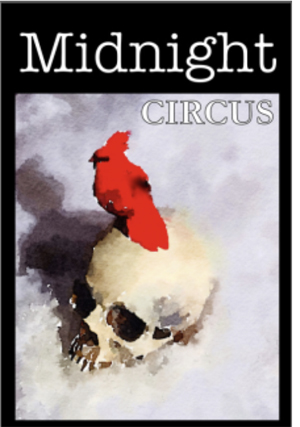Published by Midnight Circus in July 2016
“Joey, I need you to come live with me.” Grandma got him aside after the funeral. He wasn’t surprised that she was already planning ahead: Although Gramps’ death was unexpected and her grief was unmistakable, he knew her as a practical woman. “I’ll have to take in boarders, and I  don’t want strangers in the house without a man around,” she said.
don’t want strangers in the house without a man around,” she said.
He was cautious. “I’d like to help, Grandma.” In fact, he would love to get away from home; he’d be in a dorm if he could afford it. And throughout his teens her house had been his refuge from a home full of bickering and empty of attention. His bachelor uncle seemed happier; Joe went through high school thinking he would take monastic orders. College co-eds had now belatedly aroused his interest, but he was unpracticed, awkward and timid, with no model at home to prompt confidence.
Still, leap out of that frying pan of connubial chaos to live with an old lady? He wouldn’t mind taking the garbage out. Would she want him to go grocery shopping with her? Fetch things? Maybe not. Although her face was weathered, she seemed spry. “Suppose I stop by to talk. My last class Wednesday is out at three.”
“Take the D bus, Joey. Only ten minutes. It’ll save you an hour’s commuting every day. Do college boys still like cookies and milk?”
*
Her big South End house — white clapboard siding punctuated by bright green shutters, Victorian gingerbread encrusting the eaves beneath brown-weathered roof shakes – evoked memories. As a young boy he escaped the world in its attic full of books, learned about tools in the backyard garage workshop. Gramps helped him build a wren house, taught him to gut a trout, and came to his basketball games; Grandma taught him to weed the garden, darned his elbows, always had chocolate chip cookies and let him be alone when he needed to be.
In the vestibule was a new, oversize photo of Gramps in his prime, shirtless under the straps of his carpenter’s overalls, as handsomely brawny as Joe remembered him. “That’s a wonderful photo, Grandma,” he said. “A nice memorial.”
“I hadn’t thought of it that way. I hung it where anyone coming in the front door would see it. A temporary man around the house, you know? Come on, I’ll show you your room.”
Gramps had built the house as her wedding present, a huge master bedroom and bath on the second floor, plus bedrooms sharing a bath for each of the four children she would bear before she was twenty-three. “I’ll rent those,” she said. “You get the downstairs. He built it for his mother, you know.” She had lived with them until her death fifteen years later, before he was born. “It has its own bath, Joey.”
It also had a door out to a back yard patio, which made it an easy decision: He could come and go as unnoticed as he chose. Might even some day have company without her noticing; he knew she took a Catholic view of sex. Unhappily, the prospect of clandestine trysts was theoretical: He not only had no girlfriend; he was unsure he could ever win one.
She came downstairs and sat at the foot of the bed as he unpacked the next day. “Joey, I want you to call me Margie now.” She was only forty-six when he was born, she insisted. “Grandma makes me sound too old.”
“Margie, Grandma? That isn’t your real name.”
“No. Mary Margaret sounds too Irish. Your grandfather George, God rest his soul, called me Margie.”
“I can’t do that, Grandma.” One of his courses this semester was English usage. “Call my grandmother by a diminutive?”
“You mean Margie instead of just Marge. Call me that, then. Marge.”
“It still doesn’t seem right.”
“I like the sound of a man’s voice saying my name. I get lonely.”
Lonely he could understand. “Well . . . if you’ll stop calling me Joey.”
“All right. I’ll say Joe, you say Marge.”
“That’s a deal . . . Marge.” After a few weeks her name came easily to his lips: If he forgot she said imperiously, “What’s that, Grandson?” In his thoughts, though, she remained Grandma Marge.
A week later she introduced the new upstairs boarders: Four girls, juniors and seniors. He had hoped they would prove interesting, or interested, or both, giving him a chance to remedy his lack of technique. No luck: They were as plain as his sisters, scholarly-looking. “Nice to meet you, Joe,” said the flat-chested blonde with huge glasses. “Good luck with your freshman year.” She made it sound like “farewell.”
“Thanks,” he said. “Good luck to you too.”
Although they often took the same bus to college, the boarders never invited him to join their bus-stop conversations or suggested he sit with them. One afternoon, after taking the same bus back, the girls lingered at the curb, chatting girl-talk, while he walked to Grandma’s house by himself.
She noticed. An early riser, she never let him leave without breakfast. She braced him next morning in a kitchen fragrant with coffee. “You didn’t walk my boarders home from the bus yesterday.”
“No. They were busy talking.”
“I haven’t seen you make much effort to flirt with them.” She sounded old-lady grandmotherly.
“They aren’t my type. And they’re older.”
“Bob Dole is older, but he could be my type. I voted for him. She made a kissy-face, and turned it into a broad smile.
“That’s different.”
“You aren’t . . . you aren’t like that, are you, Joe?” She turned away to pour him a cup. “I mean, it would be all right with me, I guess . . . .”
He got it. “No, Grandma Marge, I’m not gay. Maybe I’m just shy.”
She turned back to put toast down, a tentative smile on her face. “But you took a girl to the senior prom?”
“I went stag.”
“You mean alone?”
“Didn’t have anyone special. The nuns kept the boys and girls mostly in separate classes, you know.” He’d danced with only two girls the whole night, both times cutting in when a pal signaled that a break would be welcome. He remembered holding both at arm’s length as carefully as china dolls, and stepping on their toes.
She popped the toast up, examined it and put it down again. “It’s that mother of yours. I don’t know what got into my son, marrying her.”
“Oh, Mom’s okay. They just fight a lot.” As he came into puberty, he’d wondered when they were loving enough to produce his younger siblings. He imagined they went to church Sundays to confess incessant violation of commandments: She made him work like a dog on Sabbath afternoons, trying to make her yard look like the neighbors’ she coveted; Dad resisted, taking the name of the Lord often, explosively and in vain.
“She natters your father all the time.”
“It’s not that bad,” he lied.
“You’ll do better than that, Joey. Don’t give up.” She popped the toast again, done this time, and busied herself with buttering. “There must be some social things at church; I’ll ask Father McGonicle.” She put the toast on plates and sat down. “Still, I’m glad you’re not running around like so many young people these days.”
He wondered if she’d ever watched the Spice Girls. She would surely find them too spicy. He bowed his head patiently as she blessed the food.
Not only did she disapprove of sex before marriage, he learned: She thought contraception a sin and suggestive advertising an abomination. While they breakfasted to the Channel Five news, she complained about the seduction of young minds. “That one, Joe,” she said one morning about a Viagra ad, “is over the line. Way over the line.”
“It’s your Bob Dole.”
“Never mind. He ought to know better.”
Living here, remembering the serenity of her life with Gramps, he’d begun to think marital bliss might not be impossible. He dared to tease her: “Gramps never needed Viagra?”
“Of course not. Didn’t exist then. I got his . . . I got his dander up without help. Four children to prove it.”
“But you stopped at four.”
“Had a child in each bedroom. Didn’t want George to make the house any bigger.”
“No, I meant how did you stop?”
The old blue eyes brightened behind her cut-rim glasses. “Abstinence makes the heart grow fonder, young Joe,” she grinned at him.
Abstinence, he thought, was a habit he hoped to overcome, but he didn’t say that.
She walked to the bus with him after breakfast every day on her way to early Mass. Despite memorizing the catechism and all that, he knew he wasn’t a true believer and could never qualify to be a monk; he didn’t go to church on the rare Sundays he went home. She guessed as much, and insisted he accompany her to Saint Brigid’s on holy days of obligation — Christmas, Easter, Pentecost, Advent. “Your grandfather did, God rest his soul. You can, too.”
They made an odd couple: Joe six feet tall, curly red hair, the map of Ireland on his face as she liked to say, and she at least a foot shorter, her own map time-worn. Her black cloche hat covered a receding hairline that her beauty shop couldn’t halt, but showed the rest of the hairdresser’s auburn handiwork to advantage. They went early so she could get a seat in front near a loudspeaker, and he could go to confession.
He knew Father McGonicle wouldn’t let him take the sacrament without cleansing his soul, so he pleaded guilty to minor or contrived offenses — “I took the Lord’s name in vain, Father” — “I have lusted after women, Father” — and cheerfully accepted insignificant penances.
It obviously pleased Grandma Marge that he could then walk with her to the altar rail to receive the Eucharist the old-fashioned way, which was why she liked Saint Brigid’s, the priest putting the wafer on their tongues and holding the chalice to their lips. “I hope you’ve made complete confession, Joe,” she always told him, “so as not to desecrate the Host.” He wished he had more to confess. Perhaps she hoped so too: She said she prayed every morning for his happiness as well as for Gramps’ salvation.
April came; crocuses fought the still-frosty ground, and pink dogwood buds promised spring. One morning Channel Five said the Virgin Mary had been reported to appear in a tree in a nearby city park, deterring a distraught young woman from suicide. When Joe came home – they often had supper together in the kitchen, macaroni and cheese or spaghetti and meatballs – she brought him up to date, having uncharacteristically spent the day watching television.
Basil and thyme seasoned the kitchen as she stirred the crimson sauce. “The Virgin led her to the spot where she would appear, Joe.”
“What does that mean?”
“She said the Virgin gave her clues. Climb a hill. Look for a tree standing alone. The number 6047. Imagine, an exact number. She found it on a manhole cover in the road near the tree.”
“The Virgin led her on a kind of treasure hunt?”
“Don’t be sacrilegious.” She rapped the spoon on the edge of the pan and turned. “They interviewed a priest who said there was a chapel there fifty years ago.”
He felt emboldened to poke fun. “Burned to the ground one night, destroying her image?”
“Joe, you’d better stop now. It was torn down when the city made the park.”
Next morning, the TV reported that two dozen people had kept vigil the night before, and the Virgin appeared for two of them. The first day’s interview with the young woman, Grandma Marge reported at dinner that night, was repeated on newscasts all day long; she was invited to help do the morning weather next week. The holy visitation had not only saved a life; it might prove a step toward a new career. “It’s a miracle, Joe. You should believe in miracles.”
The numbers grew exponentially: The Virgin appeared for three people Sunday night. On Monday, the city put up floodlights at the back of the site for crowd safety, so the news at Tuesday breakfast finally had video. Almost two hundred people faced an impromptu shrine that had sprung up at the base of a tree just leafing out, in whose upper limbs she was said to appear.
“You’ve got to walk me there tonight, Joe.”
“That’s ten blocks away.”
“No it isn’t. Maybe six or seven. I can walk that far.”
“You want to walk over there now?”
“No, I said tonight. She appears before midnight. Sometimes earlier. We should be there by ten.”
He had a paper due; he risked resistance. “So we’ll have to wait around for a homeless woman? I have to study, you know.”
“Don’t be blasphemous, Joe. The Virgin might give you some help on your next exam. And the walk will do you good.” She gave him a few hours after supper to study, then knocked at his door, wearing her cloche hat and a shawl of fluffy white Irish wool. She handed him two garden-chair cushions to carry.
At the park entrance, a few blocks away, cars were directed to a makeshift parking lot near the baseball diamond so the headlights wouldn’t profane the solemn atmosphere near the tree, a hundred yards farther in. The shrine had grown into twin arches eight feet tall, each embracing a statue of the Virgin, the roofs improvised of wire mesh and now at least a foot thick with flowers, both artificial and real. Someone had tacked a white cross fifteen feet up in the tree before the park service banned nails, whereupon someone else had spray-painted a white cross farther down the trunk.
“Joe,” she said, “there must be a place on one of the altars for prayers. I can’t jostle my way through these crowds. You take this up for me, please.”
She’d written a prayer – that the Virgin appear for her, he supposed, or maybe for him — and folded the paper a half-dozen times into a little cube. He wondered if he should have written a prayer-slip himself: “Lord, help me find a girl who doesn’t natter and fight all the time.” It couldn’t do any harm.
He picked his way forward, holding up the prayer-cube so people would see his errand and not think he was trying to get a place in front. Those nearest the shrine were sitting or kneeling, praying softly, some in Spanish; no one objected to his inching through. There were prayer-slips on both makeshift altars, amidst a forest of candles and dozens of rosaries, some draped amidst the flowers. The air was thick with incense. He wished he could pray.
By the time he got back, Grandma Marge had found a man, bald with a thick white moustache curling his face, who had seen the Virgin the night before and was showing her where to look in the thinly leafed branches. “You see that empty space up there? To the left, maybe twenty feet up.”
“I see it,” Grandma Marge said in an undertone. “A kind of dark area.”
“That’s the place.”
“And you saw her there?”
“I’d been here three nights, praying that I might see her, and last night I did. She had a gold crown on her head.”
“Now that you’ve seen her, why do you come back?” Joe joined the murmured conversation.
“This is my grandson Joe,” Grandma Marge said. “Be polite, Joe. This is Mr. DiPietro, and he is one of the elect.”
“I don’t mind your asking,” the man said. “I’d like her to appear for me again. If you’ve seen your favorite player hit a home run, do you stop going to the ball park?”
“I get you,” Joe said. He shouldn’t argue with someone who could pray and was sure he got results.
Grandma Marge had also found three ladies she knew from Saint Brigid’s. The four of them invited the old man to kneel with them on their cushions and pray for a reappearance. “I always pray with my eyes closed,” she said. “I suppose I shouldn’t tonight.”
“No,” Mr. DiPietro said, “you wouldn’t want to miss her. She doesn’t stay long.”
Joe put a hand on her shoulder. “I’ll be back in a bit,” he whispered. “I’m going to look around. See if I know anyone.” She patted his hand and resumed her open-eyed prayer.
He hadn’t gone far when a girl who looked familiar waved. “Don’t I see you in sociology?”
She was prettier than he’d noticed in class: a heart-shaped face, black hair falling to her shoulders. She wore a pale lipstick that seemed chosen as appropriate for a religious event. “Yes,” he said. “You dropped your book in class the other day.”
“And you picked it up for me.”
“It was closer to me. No big deal.”
“Exactly the point,” she said. “Too many guys would have made it a big deal. Stared at me while I reached to pick it up, you know?”
He imagined staring into her low-cut blouse as she bent over, and felt himself blush, glad for the dark. Then his imagination conjured others staring, which made him angry. Horny bastards. He had never felt protective like this.
“Anyway, thank you,” she said. Her smile had been warm when he handed her the book. Tonight it lit up her face. “Joe, isn’t it?”
“You’re Angela, right? Sorry, I don’t know your last name.”
“Diaz. Angie Diaz.”
“Hello, Angie.” He felt inexplicably tongue-tied. He considered asking her view of the sociological implications of mass expressions of religious belief. No, that would be stupid. He gave her a lame smile. “I’m Joe McNamara.”
“Hello, Joe. Is this your first night?”
“Yes. I came with my grandmother.” He gestured to the five on their cushions, ten yards away.
“The one with the black hat and white shawl?”
“That’s the one.”
“And that’s your grandfather? The bald one?”
“No, he died. That’s a man she just met. He saw the Virgin last night.”
“I hadn’t put you down as one who would care about the Virgin.”
“I’m not a very good Catholic.” His urge to prolong the conversation overcame his hesitation. “Are you?”
“I’m not sure how to tell. I go to Mass. Do you?”
“Sometimes. Grandma Marge works at saving my soul. Is this your first night, too?”
“My third night. I’m here with Channel Five. They need someone who can translate if they need.”
Joe glanced back. A burly cameraman, his camera on a tripod, was panning the crowd, a young blonde reporter at his side. “It’s hard to get good interview pictures,” Angie said, “because he can’t use his light. So he’ll stay back. The reporter has a portable mike.”
“And you do too?”
“No, she’ll point hers at me if she needs a translation. They haven’t needed me yet.”
They fell silent, facing the crowd and the shrine. Joe glanced. Her dark, wide-open eyes were accented in the dim light by black eyebrows and lashes. She was looking into the tree; he wondered if she was praying. He wondered about the efficacy of prayer, and whether it was all right to pray that the Virgin not materialize just yet so they could stand together a while longer.
“I see her!” shouted a girl nearby, pointing up. She looked to be ten or eleven. A sea of faces swiveled, then turned in a uniform wave back to the tree, lips moving. Motioning Angie to come along, the television reporter swept by, and thrust the microphone into the girl’s face. “Tell me what you see.”
“She’s right there. Don’t you see her?” She was crying joyfully.
“Is she in white?”
“Oh, yes,” the girl sobbed, “with a gold crown.”
“Yo tambien!” said a younger girl next to her.
The reporter tipped the microphone at Angie. “I see her too,” she translated.
“Her wings are open,” said the older girl. “She’s so beautiful! Just like last night.”
“You saw her last night too?” the reporter asked. “The Virgin must be special to you. Is she still there?”
“No, she’s fading now.”
“Que se ha ido,” said the other girl.
“She’s gone,” Angie translated.
The reporter spent a few minutes getting the girls’ names, then retreated to the back of the crowd. Angie came back to Joe. “The children see her because they are innocent,” she said.
“I guess so.” He did not feel innocent. “Did you see her?”
“No. Just the girls did. Listen, I can’t stand here. I’m supposed to stay with the crew, and they’re moving.”
He watched. The cameraman folded the tripod legs, shouldering camera and tripod together, moved ten yards to the right, set up again and peered through the viewfinder. He moved twice more, farther away, the blonde reporter and Angie following, before he seemed satisfied with the angle and what little light there was. Joe wanted to rejoin Angie, but the reporter was talking with her. Maybe didn’t want her socializing while she was working. Reluctantly, he went back to see how Grandma Marge was doing.
She was wide-eyed still, leaning over occasionally to whisper something to Mr. DiPietro. Joe sat down on the grass behind them, patting her shoulder to say he was there; she returned the pat without taking her gaze from the tree. Her knees must ache, he thought; this wasn’t like kneeling in church. He let himself remember Angie’s face. He was sure the Virgin wouldn’t manifest herself for him. Grandma Marge had a better chance.
There were no more visitations, though. As midnight neared, the crowd began to disperse. Grandma Marge and her group helped each other up and muttered goodnight while Joe picked up the cushions. “My knees hurt,” she complained as they started back. “My eyes have gotten dry, staring at that tree. I should have brought eye-drops. Did you see her?”
“No. You didn’t either?”
“No, darn it.”
It was like walking through the parking lot after a football game. At the park entrance, Joe tucked her hand into the crook of his arm and led her across the street to a safe sidewalk. At home, she was apologetic. “I’m sorry to drag you out with me.”
“No problem,” he said. “Don’t be sorry.”
“You’re sweet, Joe.”
“No problem at all. I was glad to be there.”
Next morning when he came to breakfast she was cooking Irish sausage and eggs. “We can eat hearty and watch ourselves on the television,” she said. While the anchorman set the scene and said how many came out last night, the screen showed a sweeping pan of the crowd from the cameraman’s last vantage point. It was dark and shadowy. “Was that you standing up?” she asked.
“Could have been,” Joe said. “Hard to tell. I thought I saw your shawl.” Then they saw a dim picture of the blonde reporter hurrying into the crowd. They could hardly discern the young girl to whom the Virgin had appeared, but could hear her clearly. They heard the cousin, too: “Yo tambien.” And Angela’s translation.
“That last is a girl from my sociology class,” Joe said. “Angie Diaz. Channel Five hires her to translate.”
“She had a nice voice.”
“Would you like to go back tonight?”
“Oh, Joe, that would be very nice. You won’t mind?”
“Maybe we should start a little earlier. Get a better spot. And bring chairs this time.”
“You’re right,” she nodded. “Some people had folding chairs.”
“And wear a white hat. Make it easier to see yourself on the tube next time.”
“I have one with a big tall feather,” she said.
Angie was in class. He’d hoped the professor would talk about the gathering in the park. Instead there was a boring lecture about demographic transitions. He rolled his eyes when she glanced at him, and succeeded in making her put her hand over her mouth to keep from smiling. He did it twice more.
“You were trying to make me laugh,” she said as class ended.
“Who, me?”
“You. Shame on you.”
“I like your smile,” he managed, feeling awkward. “Are you working again tonight?”
Her smile seemed more than casual. Deliberate. Meant for him. “Yes,” she said.
“I think we’ll come back too. I’ll look for you.”
“I won’t be hard to find,” she said. “Near the cameraman.”
Grandma Marge had corned beef and cabbage and potatoes for dinner, with pie for dessert and coffee to keep them awake. The television showed some of the previous night’s footage, then cut to the blonde reporter standing in front of the shrine. “We’ll be here when the crowd gathers,” she said, “with live reports at ten and eleven.” If Angie was there already, he couldn’t see her. Grandma Marge said Mr. DiPietro’s first name was Anthony, and that he’d come that morning to Saint Brigid’s. “Tony usually goes to Saint Joseph’s. He said he liked hearing Father McGonicle sing the Mass. I told him to bring a folding chair tonight.”
They got an early start. Channel Five hadn’t come back yet. The crowd was going to be even bigger. Joe parked them near the final spot the cameraman had chosen the night before. He set up Grandma Marge’s chair with a good view of the tree, and stood with her to save space for the Saint Brigid’s women and Mr. DiPietro. “Good evening, Tony,” Grandma Marge chirruped when he arrived. “You remember my grandson Joe.” They shook hands.
The television crew arrived. Joe watched them set up where he’d expected, then wandered over, trying to be nonchalant. “Hello, Angie. How was your day?”
“Hi, Joe. I’m glad you found me. Okay, I guess. Better than tomorrow. I don’t know how I’ll get that reading assignment done.”
“Me neither. By the time I get Grandma Marge home, I’ll be ready to hit the sack.”
“That’s her over there? Was she wearing that feather last night?”
“That was my idea. I thought it would be easier for us to spot her on television in the morning.”
“That’s great! Wait a minute.” She went to confer with the reporter, and led the cameraman back. He squatted to take a picture of the shrine with Grandma Marge’s feathered hat in the foreground. She was staring at the tree in open-eyed prayer, and didn’t seem to notice.
“Great shot!” he heard the cameraman whisper to Angie. “You have a good eye.”
“Glad to help.” She came back to stand next to Joe. A few latecomers were still straggling onto a lawn already crowded with people whose eyes were fixed on the dark spot in the tree. “To be honest,” Angie said, “I’m not deeply religious either.” She whisked out a pale blue silk shawl to put over her head. “Still, we shouldn’t stand here talking, being disrespectful.” She fell silent.
Joe closed his eyes and tried to make up a prayer that the Virgin would appear. That didn’t feel convincing, so he went through the penances Father McGonicle had given him. He did them again. Angie seemed to focus rapt attention on the tree. Half-hidden by the shawl, her serene face reminded him of how Mary was usually portrayed.
After a long time, she spoke. “I don’t think the Virgin is going to appear tonight.”
“You mean she told you that?”
“No, no. Not to little old me. That would really be a miracle. I just have a feeling. Let’s go back a little farther and just talk.”
Her grandparents, she said, had come from Puerto Rico; he told her his had come from Ireland. They both liked chocolate cream donuts, the Red Sox and the Celtics. She didn’t have a boyfriend.
The blonde reporter did her eleven o’clock cut-in. “There’s a larger crowd than last night, but no one has seen the Virgin Mary yet. We’ll keep watch for you.” At 11:30, at the end of the newscast, they had her go live again to report no sighting. The cameraman began packing up. Angie left Joe to say good night to them, and came back.
“They think it’s over,” she said. “Tomorrow is Holy Thursday.”
“Would that make a difference?”
“I don’t know. They’re betting they won’t be sent here. I’m going home.”
“Okay. How about lunch tomorrow?”
“I’d like that. I usually get to the cafeteria in the Student Center about twelve-thirty. I’ll look for you.” She turned her face up. It occurred to Joe that she was inviting a kiss. It was what Father McGonicle might have called an epiphany. He kissed her hesitantly. She put her arms around his neck and locked lips, and then pushed him away, smiling. “I’ll see you tomorrow, Joe. Good night.”
Everyone was starting home. Grandma Marge was standing, looking for him. “Tony and the ladies went along,” she said. “You had a nice chat with your Angie?” If she’d seen them kissing she didn’t let on. She tucked her chair under his arm.
“We prayed together,” he lied.
“Good. I guess you could say Tony and I prayed together too. It’s too bad the Virgin didn’t appear for anyone. It was a nice night anyway.”
They walked on in silence. Crickets and distant sirens and motorcycles filled the night with noises of the city. She shivered in the cool. He shifted the lawn chair to the other hand and put an arm around her.
“Do you believe in miracles, Joe?”
“I do,” he said. “I definitely do.”
“Me too,” she said.
-End-
Read the whole story as it appeared in Midnight Circus





